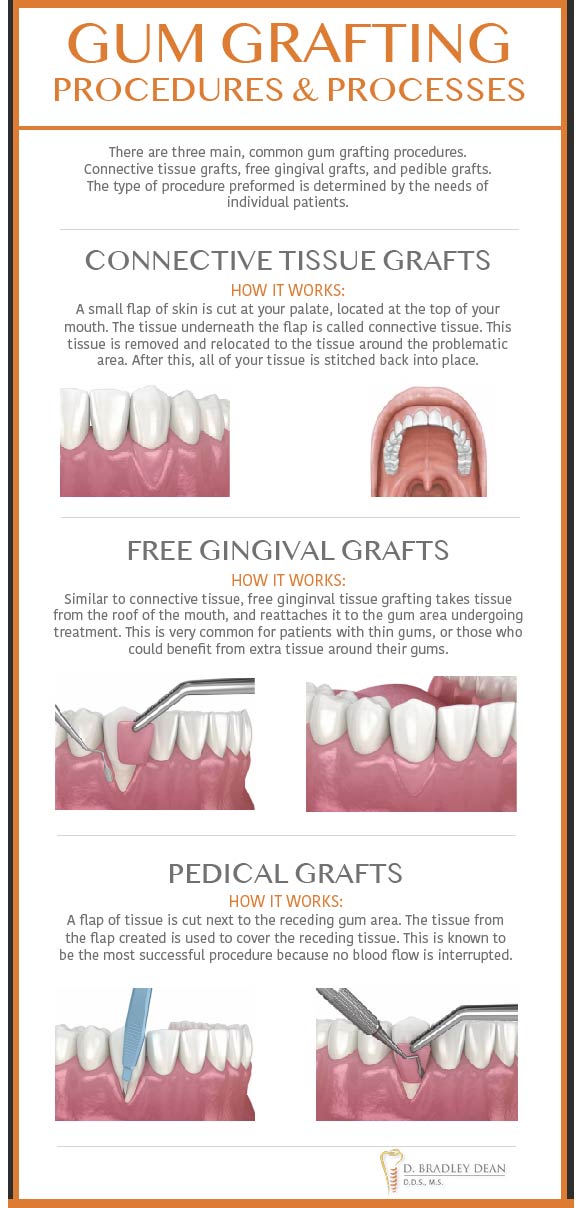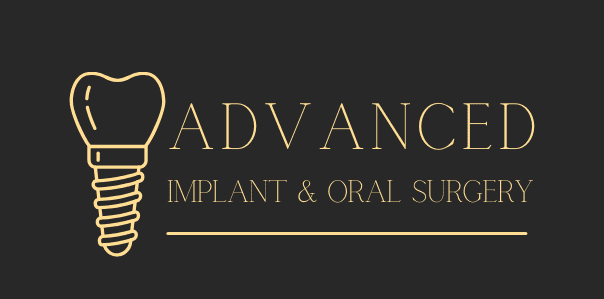A complete periodontal examination, including dental X-rays, will help us determine your treatment plan. Advanced stages of gum disease can result in gum recession and bone loss. Dr. Dean provides gum and bone grafting to help restore the gums and bone.
Gum Grafting in Plano, TX
In the advanced stages of periodontal disease, the gums can start to recede, exposing the sensitive tooth roots. Exposed tooth roots make teeth appear longer, but they are more than a cosmetic issue; they can contribute to other dental health concerns like tooth root decay, loose teeth, or bone loss.
Gum recession happens slowly over time, and most people do not realize that it is happening. Exposed roots can cause sensitivity when consuming hot or cold food or liquids. Gum graft surgery will repair the defect and prevent future gum recession and/or bone loss.
The gum grafting procedure involves placing additional gum tissue where little or no gums exist. It is a fairly simple surgical procedure performed by Dr. Dean in Plano, TX. There are numerous options for gum graft surgery. The one he will perform will depend on the extent and severity of the gum damage.
Dr. Dean will remove healthy tissue from an adjacent area in your mouth or an alternative biological material. Then, he will transfer a thin piece of that tissue to the exposed tooth roots and cover them up. The grafting procedure improves gum health, protects sensitive tooth roots, and decreases tooth sensitivity.

Periodontal Bone Grafting in Plano, TX
Periodontal bone grafting is a dental procedure that rebuilds and strengthens the bone in your jaw. Dentists often recommend it when bone loss occurs due to gum disease, injury, or tooth loss. Without enough healthy bone, teeth can loosen, fall out, or make it hard to replace missing teeth with implants. Bone grafting helps fix these problems and supports a healthy mouth.
The process of periodontal bone grafting starts with a thorough dental exam. Your dentist will take X-rays or 3D imaging to check how much bone you have lost. If they find weak or missing areas of bone, they may suggest a graft to help your jaw heal and grow strong again.
During the procedure, the dentist first numbs the area with local anesthesia so you stay comfortable. Then, they carefully open the gums to reach the bone underneath. They place bone graft material into the areas where the bone is missing or weak. The graft material can come from your own body, a donor, an animal source, or even synthetic materials. Regardless of the source, the graft acts like a scaffold, encouraging your natural bone to grow.
After the graft is placed, the dentist closes the gums with stitches to protect the area while it heals. Healing usually takes several months. During this time, your body works with the graft to rebuild new, healthy bone. You might visit your dentist a few times during healing so they can check your progress.
Periodontal bone grafting is often necessary after severe gum disease. Gum disease called periodontitis can destroy the bone that supports your teeth. Without enough bone, teeth can become loose and eventually fall out. A bone graft helps save your teeth by rebuilding the bone around them.
Bone grafting is also common when someone wants a dental implant but doesn’t have enough bone to support it. Implants need a strong, stable base to work properly, and without a bone graft, they might not stay in place.
Surgical Periodontal Treatments FAQs
In some cases, surgical periodontal treatments are essential to preserve your oral health. Learn more by reading the answers to these frequently asked questions.
What are the various types of surgical periodontal therapy?
Periodontal surgeries involve several intricate procedures. The three main categories are gingival flap surgery, mucogingival surgery, and osseous surgery.
How long does it take for gums to heal after periodontal surgery?
The typical recovery time is 1-2 weeks, although it may be longer. Successful gum grafting can lessen the likelihood of advanced gum disease and improve oral health, which is well worth a short recovery time.
Is there an alternative to gum grafting?
The Pinhole Surgical Technique is a relatively recent procedure that can be used instead of a conventional gum transplant. This minimally invasive process involves making a tiny incision in the gums, just like in orthoscopic surgery, to treat gum recession.
Is periodontal surgery painful?
Due to the anesthetic, you won’t feel a thing when the dentist works on you. However, as you go back home and the effects wear off, you may find that you are sore and uncomfortable. This may last a week or two, depending on the depth of your surgery.
Are you awake during periodontal surgery?
We treat the damaged gum area with a local anesthetic. Conscious sedation may be suggested to alleviate pain. You will be awake during the procedure, and you should not feel any pain. The conscious sedation used should help calm your nerves.
How should you prepare for periodontal treatment?
You may need to stop taking certain medications a couple of weeks before your procedure including aspirin, painkillers, and blood thinners. We also advise patients to abstain from drinking and smoking for at least 24 hours before their treatment.
